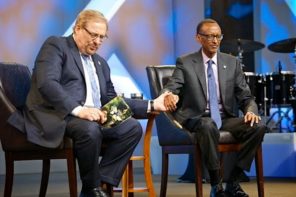Andre Willis recently posted a provocative piece on RD. He suggests that Barack Obama’s interview responses last week at Saddleback Church signal the end of black prophetic politics.
Professor Willis offers two interrelated points to corroborate his claim. First, he cites Senator Obama’s pietistic and personalistic response to what it means for him to “trust in Christ.” The author believes that the senator’s answer of redemption from sin and personal sustenance is “coded evangelical language” that reduces religion to a condition of the individual heart. Second, it is this evangelical emphasis on “saving souls” that pushes an understanding of the Christian faith as alleviating unjust social conditions outside the bounds of what it means to be a “true believer.” Obama’s privileging of personal salvation thus causes him to sound more like Billy Graham than Martin Luther King, Jr. This, according to Willis, demonstrates how evangelical whites, not the prophetic black church, have become the new religious standard bearer, setting the theological tone for black politicians.
For the sake of full disclosure, I should say that Professor Willis is a brother beloved, brilliant scholar and even better human being. But on this particular topic, I believe that my dear friend is as wrong as a Jheri Curl in July! I make this claim not based upon the virtue of Senator Obama’s performance at Saddleback. (Although I do believe his responses were appropriately nuanced, theologically sophisticated, and a Niebuhrian impulse was identifiable in his reflections on evil.) Rather, I call into question Professor Willis’s assumptions about American evangelicalism, black politics and the black prophetic tradition that inform, and dare I say, distort his view on the relationship among the three.
To begin, it appears that Professor Willis equates American evangelicalism with conservatism and then reduces both to the racial category of whiteness. No doubt in the closing decades of the previous century figures like Jerry Falwell performed CPR on the white (supremacist) fundamentalist movement that had seemingly died in relevancy and respectability after the Scopes Trial. No longer H.L. Mencken’s “ignoramuses” and “morons,” the Religious Right proved to be a productive ally in the Republican Party’s bigoted southern strategy.
But just because CNN took the ideological bait and began to identify the term “Evangelical” with White-Anglo-Saxon Conservative Protestantism, does not mean that this equation is historically or religiously accurate. Did not many evangelicals act as conductors along the Underground Railroad and become prominent voices within the Abolitionist movement? Were not evangelicals such as Washington Gladden and Walter Rauschenbusch the theological architects of what we refer to as the Social Gospel movement? And, most importantly, is not the “black church” principally evangelical in its Great Awakening origins and contemporary orientation? If so, why should progressives be so quick to either dismiss or delimit what constitutes an evangelical world view?
Being evangelical is no more antithetical to the prophetic strand of the black church than R&B is to gospel music. They are indeed kissing cousins! This is why Martin Luther King, Jr., one of the most prominent evangelicals in American history, adapted the slogan “Redeeming the Soul of America” for his Southern Christian Leadership Coalition. He, like many others, understood that when personal salvation is tempered by humility it works in conjunction with, not in opposition to, social transformation and redemption.
Furthermore, Professor Willis seems to equate the black prophetic tradition with the black political tradition. As he says concerning the consequence of Obama’s embrace of evangelicalism, “Gone are the days when having the R-e-v in front of your name and being a Black politician set the tone for religious/political engagement.” The author is clearly evoking the popular DuBoisian image of the black preacher as all things in the black community, including politician and machine boss. And, of course, we all have memories of Congressman John Lewis or Reverend Jesse Jackson turning the Democratic National Convention into a revival service with their soul-stirring speeches, and Rev. Al Sharpton attempting the same. If nothing else, you can surely count on these folks to evoke the legacy of the Civil Rights Movement and Martin Luther King, Jr. just as sure as Sharpton’s hair would be “fried, dyed and laid to the side.”
But religious symbolism and prophetic substance are strangers to one another. There has indeed been what Adolph Reed refers to as a “mythology of the church in Afro- American Politics.” The vast majority of African American elected officials in this country extend from occupational backgrounds other than ministry. And most only appeal to the real progressive wing of the black church when politically expedient. Which tends to be, by the way, err, um, NEVER! (Let’s be clear, the Civil Rights Movement has become a socially acceptable American leitmotif and is now disassociated from radical politics. Just ask Rev. Jeremiah Wright!)
Congressman Adam Clayton Powell, Jr., who was himself a famed and progressive pastor, resorted to blackmail and slander to keep Martin Luther King, Jr. quiet around convention time. His treatment of King in 1960 made Obama’s public denunciation of his former pastor look like a mild misunderstanding. Jesse Jackson’s “prophetic” political campaigns in 1984 and 1988 were easily co-opted by appeasing Jackson’s rabid opportunism with a backroom deal from Party officials. And Al Sharpton has effectively pedaled his position as a “prophet standing outside the gates” of the Democratic Party into a lucrative radio and television career as the point person on all things black. So why should we regard Senator Obama’s post-racial, “I just love me some Jesus” strategy as any less prophetic or more politically placating than the strategies of many of his political forerunners.
The point I am trying to make here is that when we equate those who represent the best of the black prophetic tradition with those who give it lip service for political gain we discredit the former. Is this the end of black prophetic politics? Only if you believe that there has ever been such a thing. But in terms of the black prophetic tradition, it will live on. Obama’s personal faith or the outcome of this election matters little in this regard. There will continue to be Christians of all racial backgrounds who will interpret the Gospel message through the lenses of liberation. They will never seek political office; they will never attempt to transform their ministry into a transnational corporation; nor will they ever seek to keynote a national political convention. But wherever they identify evil and injustice in the world, you will find them stuttering like Moses, “Let my people go!”




